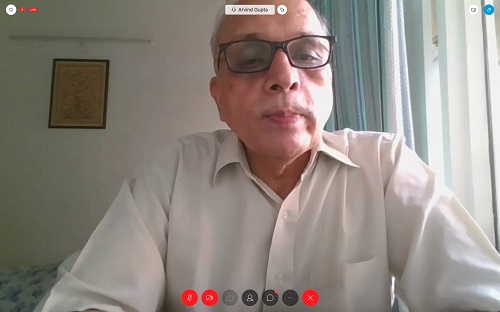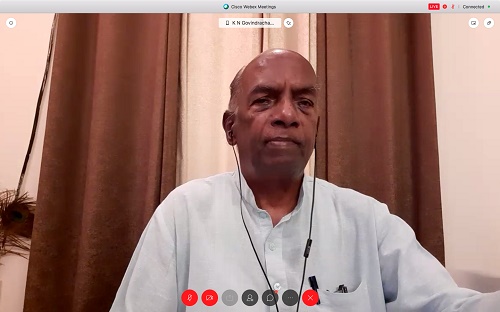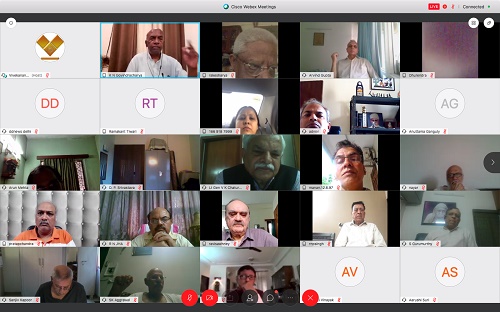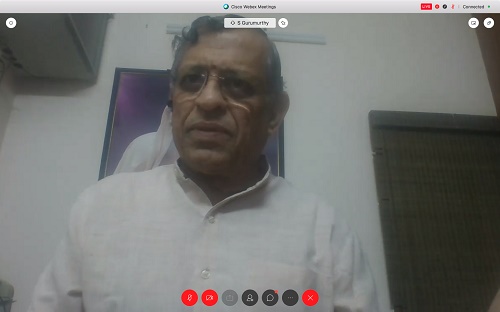On 25thJune, 2020, Vimarsha was held through a webinar at VIF, on the topic "Story of Emergency (1975-1977): the Greatest Threat to Democracy, How the people fought and won". It has been 45 years since the declaration of the National Emergency in India and the idea behind the event was to recall the suspension of the fundamental rights by the imposition of Emergency within India under Mrs Gandhi's administration and reminiscence the stories related to Emergency. The discussion was carried out by a panel comprising of KN Govindacharya, founder of Bharat Vikas Sangam, Eternal Hindu Foundation and Rashtriya Swabhiman Andolan, and former Rashtriya Swayamsevak Sangh pracharak, Dr A. Surya Prakash, Vice-Chairman, Executive Council, Nehru Memorial M & L and former Chairman of the Prasar Bharati, Shri S Gurumurthy, Chairman VIF as well as a well-known economic and political analyst, and Dr Arvind Gupta, Director of the VIF.

Dr Arvind Gupta began by alluding to the 'Emergency of 1975' as the darkest period in Indian Democracy. He said that 25th June is a reminder of the dark day in the modern Indian history that posed a significant threat to Indian Democracy and was also a great opportunity to recall the resistance of the brave people who restored our democratic ethos. He then opened the floor for discussion by the panellists.
Mr KN Govindacharya began the discussion. He recalled the days of Emergency (1975-1977) imposed by the then PM Mrs Gandhi. For much of the Emergency, he said, most of Indira Gandhi's political opponents were imprisoned, and the press was censored. Several other human rights violations were incurred as well, including a mass forced sterilisation campaign spearheaded by Sanjay Gandhi, the Prime Minister's son. The government made blatant and extensive use of its power of preventive detention. Mr Govindacharya, as a RSS functionary, was actively involved in the student agitation in Bihar and the campaign against Emergency. He stressed that the Bihar Movement was an actual mass movement initiated by students in 1974 and was led by the Jayaprakash Narayan, against misrule and corruption of Mrs Gandhi's government in the centre. He, then, maintained that Bihar movement had all the characteristics of a mass movement as it consisted of three main elements (core to the structure of mass movements): i) a ripening situation, ii) minimum infrastructure to influence the messaging of the movement and, iii) a credible leadership.

Mr Govindacharya said the Rashtriya Swayamsevak Sangh had provided the central organisational infrastructure for an underground campaign against Emergency. At the same time, Jayaprakash Narayan became the movement's credible leadership face. The Bihar movement was a total Revolution movement (Sampoorna Kranti), where people from all walks of life came together and represented the spirit of unity and dissonance against the government's anti-democratic measures. He referred to it as one of the monumental movements in modern Indian history and a true reflection of values of leadership, collectivism, public dissent against the wrong-doings of the government. He stressed that the movement was carried out through the sheer love and patriotism for our motherland. Noting that Prime Minister Narendra Modi had recently asked people to beat utensils and light candles to boost the campaign against the coronavirus, Mr Govindacharya said these practices were used in the mass campaign against the Indira Gandhi government, as well.
Furthermore, Dr A. Surya Prakash, former Chairman of the Prasar Bharati, began the discussion by ruminating that 45 years have gone by, but the memory is still afresh for those who lived through those moments and value the democratic principles enshrined in the Constitution. It is essential to discuss this event because every generation needs to know how fragile democracy can be. Moreover, such derailment of our democracy and waning of core values of our constitution can never be repeated. He then began to narrate the timeline of the events that transpired that led to the declaration of Emergency in India. He remarked that the events of the day are well documented by the Shah Commission, which enquired into the excesses of the Emergency. The drama began after Indira Gandhi decided to summon Siddhartha Shankar Ray, the CM of West Bengal. She told him that "India required a shock treatment". Ray advised her to impose an internal emergency under Article 352 of the constitution. Mrs Gandhi took him along to meet President Fakruddin Ali Ahmed and informed him of her decision. The President asked her to make the recommendation. Ray asked her to consult others, but Mrs Gandhi had other ideas. She found a rule to bypass the Cabinet. Meanwhile, R.K. Dhawan, Sanjay Gandhi and Om Mehta, the minister of Home Affairs, were drawing up lists of opposition leaders who were to be arrested that night.
However, while she kept the cabinet ministers out, she informed Dev Kant Barroah, the President of the Congress Party. Also, she asked him to join Ray and draft the speech she wanted to make over the All India Radio the next morning. This exercise went on until 3 am the next morning, according to Pupul Jayakar, Mrs Gandhi biographer. As it ended, Ray heard from Om Mehta that orders had been issued to, "lock up the High Courts and cut off electricity to all necessary newspapers". Ray was horrified and asked to see Mrs Gandhi. The Shah Commission's report graphically describes what happened next. Mrs Gandhi was late in coming, and while Ray was waiting, Sanjay Gandhi met him in a highly infuriated state of mind and told him that he did not know how to rule the country. Eventually, Mrs Gandhi came out, and Ray told her of the plan to "lock-up" the High Courts. She asked Ray to wait until she found out what was happening. Upon her return, Mr Ray noticed that her eyes were red from weeping, "Something very hard has happened". She assured Mr Ray that the High Courts wouldn't be locked up and the electricity wouldn't be cut off to the newspapers either. Nevertheless, the opposite transpired.
Home Minister Brahmananda Reddy was summoned that night at 10:30 pm told about the decision and asked to sign a letter that was put before him. It was a letter from him to the President enclosing a draft proclamation of the Emergency for the President's assent. Strange as it may seem, the letter to the President signed by Reddy was on a plain sheet of paper. K Balachandran, Secretary of the President told the commission that he advised the President not to sign it until it was ratified by the Union Cabinet. "Moreover, it was worded in such a manner as would make it appear that the decision to declare Emergency was that of the President based on his satisfaction". However, Mrs Gandhi sent R.K Dhawan to the President and got him to sign it.

Such was the secrecy surrounding the development that Law Minister H.R. Gokhale heard about the presidential proclamation only when he arrived for a meeting of the Union Cabinet at 6AM on 26 June. Cabinet Secretary B.D. Pande heard about it when he got a call from the Prime Minister's house at 4:30 am and was told that the Cabinet would meet at 6 AM. Even more strange was the case the Home Secretary, Mr SL Khurana and Mr Atma Jai ram, Director of the Intelligence Bureau. Though top opposition leaders including Jai Prakash Narayan, Morarji Desai and others had been arrested, the Home Secretary was blissfully unaware of what was going on. The head of the Intelligence Bureau learnt that the country was under an internal emergency only when he reached his office on the morning of 26 June.
In other words, it was not the PM office of GOI which was calling the shots, it was a coterie around Mrs Gandhi and Sanjay Gandhi, and it was the PM's household that had taken charge of the nation's affairs. The next 21 months saw untold misery as the government imposed censorship on the media and bamboozled the bureaucracy and the high Judiciary to do its bidding. The police went berserk, and lakhs of people were jailed under harsh law like MISA. It seemed as if the people had lost democracy forever.
Dr Surya Prakash said in his concluding remarks that this story needs to be retold every year just to remind ourselves of the horrendous consequences that await us if we lose our democratic traditions. He argued that the individuals who destroyed our democracy during the Emergency have never apologised. Nor have they been punished. However, if we do not want a repeat of this ever, we must neither forget nor forgive the perpetrators of the Emergency.
After that, Shri Gurumurthy began by narrating his experiences during the Emergency. He remarked that it was a great day to look back now but darkest at the time. He pointed out that the seeds of Emergency were laid with split in the Congress party in 1969. He said that, it was then the entire pyramid of congress leadership was destroyed. There was a complete disappearance of internal democracy and dissent within the party which led to its split. He emphasised that as a polity student he had witnessed that the AICC session used to be intense criticism of the government and the individual ministry and the minutes' from the sessions used to be published in the newspaper, before Mrs Gandhi came to power. Congress was a party with grassroots membership, with a mixed bag of people and what bound them together was an idea of 'India' based on a nationalistic approach.
Nevertheless, this moral characteristic was gone with the split in the party in 1969 and laid the seed of Emergency. On 12 November 1969, the Prime Minister of India Indira Gandhi was expelled from the Congress party for violating the party discipline. The party finally split with Indira Gandhi, setting up a rival organisation, which came to be known as Congress (R).
Shri Gurumurthy said that Mrs Gandhi's party was of a different breed from the Congress of old, which had been a robust institution with traditions of internal democracy. Mrs Gandhi was frightened of shadows of dissent within the party against her and took decisions through her kitchen cabinet, which led to growing concern over her political morality. In the coming years, her influence was such that she and her kitchen cabinet could install hand-picked loyalists as chief ministers of states, rather than their being elected by the Congress legislative party.
Furthermore, Shri Gurumurthy said that the elimination of all party structures and influential leaders, made Mrs Gandhi an absolute leader, she directly communicated with the people without any intermediate power structure of the party and that became the position even within the government. She projected herself as the champion of the marginalised masses, and her government projected itself for the poor. And those who went against it were brandished as 'anti-poor'. Everything was put in ideological-framework, and ideological divisions replaced the harmonious national polity. Analysed in retrospect to be one of the darkest periods of post-independent Indian history, the two-year-long period of Emergency was also perhaps the most momentous episode in the political evolution of the Indian National Congress.

Shri Gurumurthy narrated that during the Emergency, a pattern was worked out against civil agencies that acted as an impediment to the absolute control of the government and Mrs Gandhi's party. Banks were nationalised, courts were targeted, and her administration targeted even the Constitution of India, which holds the fundamental rights of the citizens of the country. The 42nd amendment was passed. It reduced the power of the Judiciary to determine the constitutional validity of laws and curtailed democracy by giving the Prime Minister's Office unparalleled powers. This amendment changed the basic structure of the Constitution.
Shri Gurumuruthy remembering the dark days said that he himself was targeted as a CIA agent for voicing his dissent as this was the kind of ecosystem developed within India. Emergency corrupted every public organ of the government. A "committed bureaucracy" and "committed judiciary" was established that required impartial government officials to be "committed" to the ideology of the ruling party and not of the Constitution of the country. Acts of dissent and resistance did happen during the Emergency, and newspapers like the Indian Express and the Statesman protested against censorship by leaving blank spaces where news items had been censored. Shri Gurumurthy further emphasised that Emergency was imposed in 1975 as the Congress had become the asset of "one family", and the country continues to face the threat of Emergency because of weakening of its institutions over the decades. So long there is no cadre in the party, no hierarchy and internal dissent, the threat of Emergency looms. Emergency reflected the failure of individual character and the failure of Indian polity.
In his concluding remarks, he maintains that the 'Emergency' has brought about permanent changes within Indian Polity, Judiciary and Bureaucracy. It caused the destabilisation of Judiciary, a corruptive and weakened polity and civil services. He labelled Emergency equivalent to a disease that crept and corrupted the entire system. The event of 25th June is a stark reminder that institutions of democracy and democratic values should be strengthened. This is a continuous task. We should never allow our constitution to be subverted by anyone on any pretext.










Post new comment